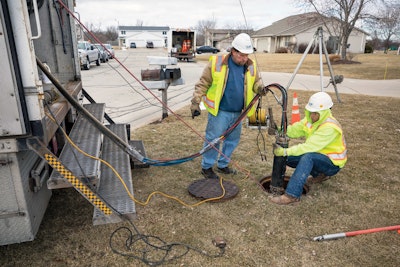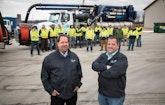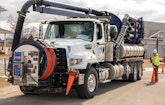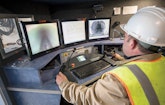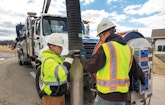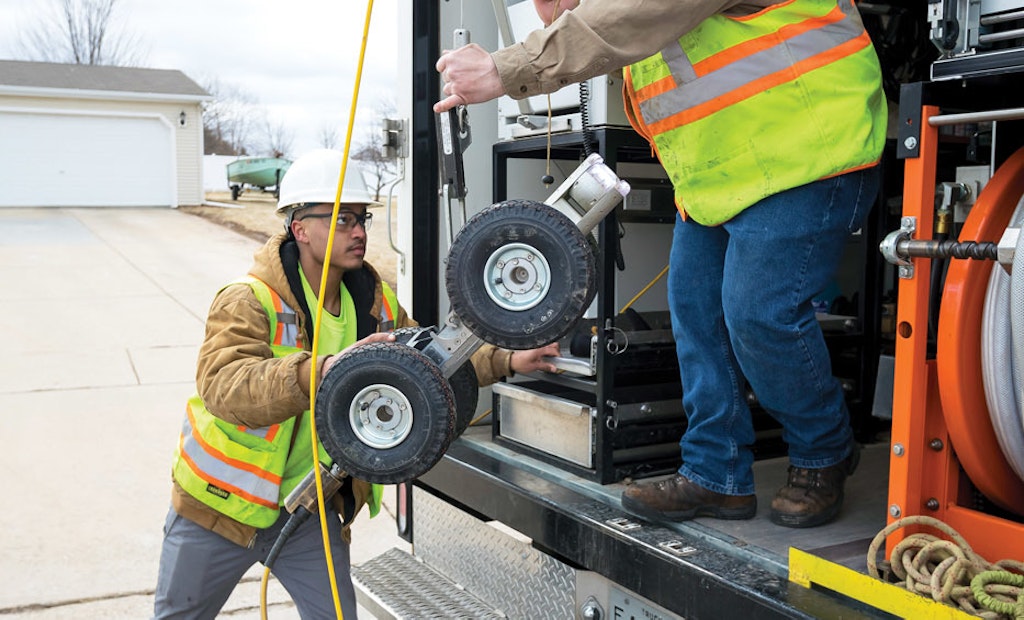
Marcus Jenerson (left) and Great Lakes TV Seal co-owner Brett Healy launch an IBAK T76 tractor and Orpheus camera into a manhole to inspect a sewer main in Bellevue, Wisconsin.
Interested in Business?
Get Business articles, news and videos right in your inbox! Sign up now.
Business + Get AlertsCrews at Great Lakes TV Seal readily go to extremes to serve the company’s municipal customers, even if it means inspecting underwater sewer lines via barges and boats or using all-terrain vehicles to transport portable inspection systems through swamplands.
“That’s one of our niches — doing jobs that other people won’t do,” says Brett Healy, 45, who co-owns the Green Bay, Wisconsin-based company with his brother, Greg Healy. “We look at jobs as challenges, and before you know it, you’re home — the time just flies. The key is finding and enjoying the challenges in what you’re doing. It’s either in your blood or it’s not.
“Dad just never accepted it when someone told him something couldn’t be done,” Healy continues. “He always says the best job to do is the one someone else says can’t be done. And us boys feel the same way.”
Learning curve
That can-do philosophy, coupled with a strong emphasis on professionalism and continual investments in new technology that improve customer service and reduce their costs through improved productivity, have served the company well since Healy’s father and mother, Jeff and Denice Healy, bought it in 1984. During the ensuing decades, its roster of equipment expanded dramatically, employment rose to 20 people and gross revenue skyrocketed 4,900 percent. Sales revenue for 2017 was around $3.5 million.
Moreover, the company’s customer base expanded to include the entire state of Wisconsin and Michigan’s Upper Peninsula. Its main clientele is municipalities that need pipeline inspections, cleaning and rehabilitation. But Great Lakes TV Seal also serves industrial companies, such as paper mills, food-processing plants, and dairies, along with cleaning and inspecting leachate lines at county landfills.
Not too bad, considering that Jeff and Denice Healy were industry novices, having first spent years running a family restaurant in Barron, a small farming community in northwestern Wisconsin. The couple switched careers to avoid the cyclical recessions that hurt restaurants, plus they wanted a business where their sons could build careers, too.
“They looked at various businesses and somehow this opportunity landed in front of them,” Healy recalls. “They knew the whole family could get involved and that’s basically how it started. Call it a leap of faith, I guess.”
The learning curve was “huge” in terms of learning the nuts and bolts of an entirely different industry, Healy says. But his father was a quick study. Moreover, there were nowhere near as many manufacturers of pipeline inspection and cleaning equipment at the time, plus the equipment wasn’t as complex to run, either.
But perhaps the biggest contributor to the company’s growth was Jeff Healy’s risk-taking mentality — his willingness to invest in new, productivity-enhancing equipment that differentiated his company from competitors and helped technicians do more work in less time. “A lot of things Dad pioneered,” Healy notes. “He’d buy the first prototype when new technology came out, then give feedback to the vendor for possible improvements.”
Embracing technology
The company has taken a two-pronged approach to new technology. The first focused on buying new equipment based on customers’ needs. “We wanted to be a one-stop shop — never be in a position where we have to tell a customer we can’t do something,” Healy says. “If we see a customer that has an issue, it gives us a reason to make a technology leap right then and there.”
The second prong centered on spotting new technology and creating a niche market for it. As an example, Healy cites the company’s investment in pipeline inspection cameras with pan-and-tilt capability when that technology first emerged in the market. “Dad knew that once engineers saw these cameras’ capabilities, they’d start to spec it in contracts,” he says. “He has great business instincts.
“To keep this business alive, we don’t want to flatline in this industry,” he continues. “We’re always trying to find that next service that might be of value to our customers. We read trade magazines and go to the Water & Wastewater Equipment, Treatment & Transport Show to stay well-informed about what’s happening on the East Coast and coming this way … and wait for opportunity to strike here.”
Manhole rehabilitation provides a good example of how Great Lakes TV Seal prepares to capitalize on new trends. They noticed that as cities reduced their inflow and infiltration through initiatives such as low-flow toilets, the result was less air movement and water flow in sewers. That subsequently led to higher levels of hydrogen sulfide, which hastened the deterioration of concrete manholes and sewer lines.
“We saw pipes and manholes deteriorating, so we did our due diligence on technology,” Healy explains, which led to services such as epoxy coatings for manholes. “Every one of our services was pretty much spawned that way.” The upshot: Keep current with technological developments because things change rapidly. And keep in mind that companies have to spend money to make money. “We aren’t afraid to pay more for the best equipment,” he notes. “Dad preached to us for years that people will pay for quality, so don’t cheapen up equipment or services.”
Building a fleet
For inspecting pipelines, Great Lakes TV Seal relies on 10 camera trucks featuring systems (including lateral-launch equipment) made by Aries Industries, Cobra Technologies (Trio Vision), and RapidView IBAK North America; three Aries Industries grout trucks capable of rehabbing mainline pipes up to 60 inches in diameter; three Vactor 2100 Plus combination vacuum trucks with 12- to 15-cubic-yard debris boxes, 1,500-gallon water tanks and positive displacement blowers made by Roots Systems; three waterjetting trucks built on either International, Freightliner, or Ford chassis and featuring jetter units made by FMC Technologies, SRECO Flexible, and Aquatech (Hi-Vac); a PipeHunter trailer jetter built by Texas Underground; and an easement machine made by KWMI.
“When we have to go through backyards or golf courses to get to interceptor lines for cleaning and we don’t want to disturb grass lawns, we use the easement machine,” Healy explains. “A lot of times the manholes on those (remote) interceptor lines are 1,000 feet apart. They usually go through swamps, so the less manholes, the better. Our trucks carry 800 feet of 1-inch-diameter hose, and the easement machines carries another 950 feet. We send out the easement machine while the vac truck still supplies the water and vacuum power.”
The company also owns robotic cutters for reinstating laterals or grinding down protrusions; they use units made by BJR Trading APS, Schwalm Robotic USA and Dancutter, plus similar nonrobotic machines built by Nu Flow Technologies and Picote Solutions. For waterjetting nozzles and chain whips, the company invests in products made by Enz USA, KEG technologies, NozzTeq and StoneAge.
For rehabilitating sewer lines, the company relies on a variety of CIPP lining technologies suitable for various applications, ranging from spot repairs to full-out lining. Vendors include AMerik Engineering, Trelleborg Pipe Seals and Nu Flow Technologies. For cementitious and epoxy manhole coatings, Great Lakes TV Seal invests in AP/M Permaform systems.
Keys to success
Employees play just as important a role as investing in reliable, cutting-edge equipment and machines. Having employees who possess the right mindset is critical to customer satisfaction. “Our employees have to be positive and realize they’re working for the customer,” Healy emphasizes. “They also have to be problem-solvers. We always tell them that they should never say they don’t know something or that we can’t do something. We tell them to always first come back to the shop so we can talk about it.
“They need to understand that they must create cooperative relationships between them and customers, not just with Great Lakes,” he says. “It’s the greatest thing when municipalities call and ask for an employee by name. We’re very big on developing relationships — letting customers know that we’re here not just for the job we’re working on, but the next one and the next one and the next one.”
Emphasizing professionalism also has been critical to the company’s growth. That means employees wear company-issued shirts (not full-scale uniforms); are cleanshaven; and don’t smoke, cuss, or chew tobacco on job sites. “All the guys also are trained to get out and shake hands with whatever city officials are on a job and hand out business cards,” Healy adds.
“We’re pretty big on making a good first impression,” he continues. “We use this example with our guys all the time: If you were laying on a gurney and one doctor walked in wearing a suit and carrying a gold pen and a clipboard and a second doctor came in wearing flip-flops and a tank top, which one would you want to operate on you? I know people say you shouldn’t judge a book by its cover, but if you have to go to someone’s door to ask them for permission to shut off their water, you should be presentable.”
In that vein, technicians carry booties and protective Tyvek paper suits in their trucks. That way they also have something clean they can slip over dirty clothes if necessary. They’re also told to clean up job sites and leave them cleaner than when they arrived. “If you’re standing by a fire hydrant and you see a Snickers candy-bar wrapper on the ground, we want you to pick it up,” he says. “If you don’t, whoever hired you will think you left it there. That’s another one of our small keys to success.”
Staying the course
While Jeff and Denice Healy are now retired, they both still come to work regularly; Jeff Healy handles quotes for jobs, and Denice Healy handles interviews and office affairs. “Mom doesn’t get a lot of recognition, but she’s been such a key part of the business,” Healy says.
What lies ahead for Healy and his brother, who assumed control of the company in December 2017? Slow, measured growth, Brett Healy predicts. Too often, he believes, exponential growth is considered a benchmark for success. “But that philosophy doesn’t register with us,” he notes. “I have always been taught — and now I see the value in — growing the business slowly. We never want to be the biggest. We just want to be the best.
“We could easily get much bigger in size,” he continues. “But then we run the risk of losing that personal contact with our employees. I might lose the contact with the equipment vendors we use, and our employees could lose track of the values we hold dear. And in turn, we could all lose contact with the customers, which would be very detrimental.”
Healy says future business growth will come from the same philosophy that thrust the company into the position it occupies today: looking for new technologies that will benefit customers. “We’re ramping up for some new niches — things on our dinner plate that haven’t had a market here yet, but we know they’re marketable,” he says. “We want to keep helping our existing customers by providing additional amenities to what we already do.”
To buttress relationships with customers, the company periodically holds meet-and-greet lunches to kick the tires on and demonstrate new technology. It’s a great forum for teasing out critical information, like whether or not customers see potential uses for new machines and equipment.
“We want to be the company that provides what they need,” Healy says. “It’s just that simple.”
Sometimes inspecting sewer lines requires life preservers
Great Lakes TV Seal in Green Bay, Wisconsin, periodically gets hired to inspect sewer lines managed by a local sewage district. That’s usually not a big deal — except for the several miles of pipe that lie underneath the bottom of the Fox River.
Inspecting those lines requires small aluminum boats and barges the company owns. In some instances, Great Lakes TV Seal even has to rent a larger barge from a local bridge-building contractor. The boats carry technicians and safety equipment, while the barges are used to transport inspection and rehabilitation equipment, explains Brett Healy, who owns the company with his brother, Greg Healy.
“The manholes aren’t completely submerged and are used as buoy markers for ship navigation,” he points out. “We tie up to them using cleats on the manhole. After that, it’s just like working on land, just without traffic signs and safety cones.”
Technicians commonly use a wheeled Aries Industries TR5000 tractor/camera unit to inspect the lines, which usually are 27- to 48-inch-diameter pipes. Challenges include the weather and water control since the crews usually are working amidst a series of locks and dams. Communication and close coordination with agencies such as the Fox River Navigational System Authority and the Army Corps of Engineers is critical because they all control bits and pieces of the water-discharge process, Healy says.
“We also have to stay in touch with the dam tenders to make sure the dams ahead of us aren’t opened when working on the lower river. This portion of the river contains whitewater rapids that can be eliminated by channeling elsewhere or holding water above the dam while we work. And if an upstream dam starts releasing water, it can flood out the manholes. There’s an element of risk because if the water starts rising quickly, you can’t shut the manhole right away because you need to remove the camera first. But we’ve never had a problem — knock on wood.”
